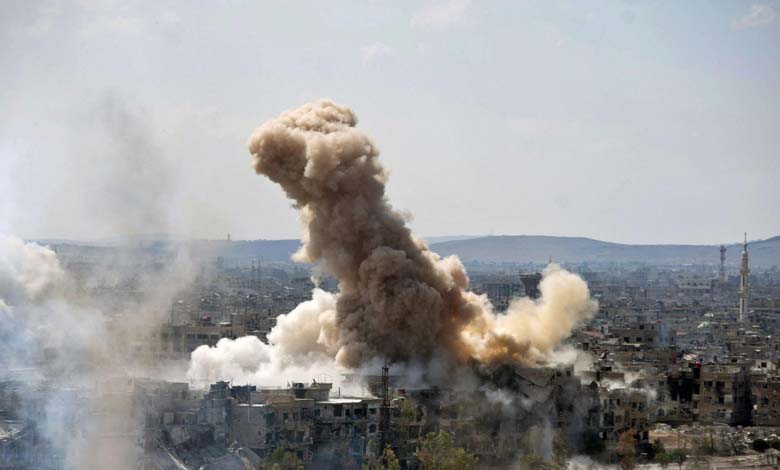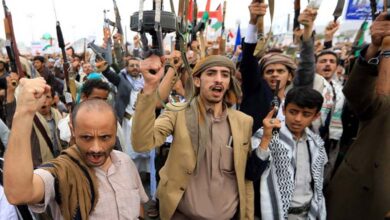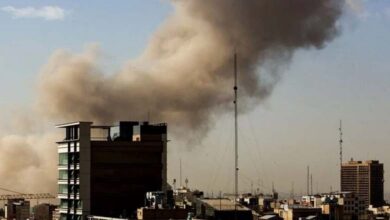A Rocket Attack Shakes Damascus as Israeli Denial Deepens the Mystery

Syria’s Ministry of Defense has vowed to pursue those responsible for what it described as a “treacherous attack” that struck residential neighborhoods with Katiusha rockets launched from the outskirts of the city.
The quiet of Friday evening was shattered by the sound of a powerful explosion that plunged the Syrian capital, Damascus, into tension and uncertainty. Two Katiusha rockets struck the western Mezzeh district, according to local authorities.
-
Damascus and Talks with the SDF: No Dialogue Under the Threat of Arms
-
UN Report Denies Any Link Between Damascus and Al-Qaeda
A Syrian military source revealed that the Ministries of Defense and Interior had launched a joint and urgent investigation to uncover the circumstances of what they called a “treacherous attack”. However, the identity of the perpetrator remains unknown, casting further ambiguity over one of the most sensitive areas in the capital.
The incident occurred in Mezzeh 86, a densely populated residential neighborhood, where the rockets hit a civilian home, injuring a woman moderately, according to the Health Ministry’s emergency department.
Images broadcast by state television showed the destruction inside the targeted room, including a visible hole in the wall and scattered debris — physical evidence of the force of the explosion, which echoed across nearby districts.
-
Damascus Issues Final Warning to Unify All Weapons Under State Authority
-
Damascus bans entry of Iranians via airports after threats from Tehran
Local residents reported hearing “a loud explosion preceded by a sound similar to that of a falling rocket”, suggesting that the attack was sudden and planned.
The state news agency SANA quoted a military source confirming that “the treacherous attack was carried out using rockets launched from a mobile platform”, adding that “the parties behind the attack and the tool of execution remain unknown so far”.
This is the central point of mystery: using a mobile launcher indicates a professional operation designed to allow quick withdrawal, making it difficult to trace the source of the fire.
-
New Governor of Damascus Calls for U.S. Mediation for Peace with Israel
-
Attack on an Internal Security Checkpoint Reveals the Fragility of the Situation in Sweida
Later, the information department of the Ministry of Defense stated that the rockets had been launched “from the outskirts of the city toward residential areas”, pledging that it would “pursue those responsible for this criminal act and take deterrent measures against anyone who threatens the security of the capital”.
The ministry emphasized the criminal nature of an attack directly targeting civilians, placing it outside conventional military engagements and into the realm of actions threatening internal stability.
The attack in Mezzeh has reignited questions surrounding the nature of security-related operations in Damascus.
-
Israel continues its incursions in Syria despite the prospect of a security deal
-
Hezbollah Cell in Syria: Details of the Terrorist Plot and Heavy Weapons Seizure
Israel’s public broadcaster quoted an Israeli official stating that “Tel Aviv has no connection to the explosion that occurred in Damascus”, an unusual denial given that many strikes attributed to Israel typically target military sites or figures in the capital’s vicinity.
This denial deepens the uncertainty and opens the door to several potential scenarios.
One possibility is that an opposition group, perhaps a sleeper cell inside the city or a group located nearby, exploited a moment of relative security laxity to carry out a “quick and relatively simple” attack using Katiusha rockets fired from a mobile launcher — an operation aimed at generating public and media impact rather than relying on advanced military capabilities.
-
Syria Urges the UN Security Council to Take a Firm Stance Against Israeli Airstrikes
-
Details of Israel’s first airborne landing of its kind in Syria
Another scenario suggests a settling of scores or an exchange of warning messages between rival local actors within the circles of influence.
Targeting a sensitive district like Mezzeh, home to security and military facilities, could represent a demonstration of capability to penetrate the capital’s depth, even if the civilian home hit was merely collateral.
A third possibility involves a regional actor seeking to destabilize the capital’s security environment without assuming direct responsibility, aiming to sow confusion and undermine Syria’s internal security.
-
Key Provisions of the Expected Security Settlement Agreement Between Syria and Israel
-
Israeli Humanitarian Corridor to Sweida Facilitated by U.S. Mediation Efforts
The strategic importance of Mezzeh reinforces this possibility. Its sensitivity makes it a frequent target and an ideal location for sending “warning shots” or “pressure messages” through means whose responsibility can easily be denied.
Security forces continue to investigate the circumstances and pursue the perpetrators, describing the operation as unusual and opaque.
A strict cordon has been imposed around the affected area to collect evidence, determine the rockets’ trajectory, and identify the exact launch site. Authorities affirmed that they would “provide the public with all details progressively”.
-
Shock in Syria after execution of medic at Suwayda hospital
-
Syria Welcomes Multi-Billion Dollar Investments for Post-War Reconstruction
The attack on Mezzeh 86 — a densely populated neighborhood — marks a dangerous shift in the nature of operations targeting the capital, even if the rockets used were rudimentary.
The incident highlights a potential security vulnerability, as a “mobile launcher” apparently managed to approach Damascus’s outskirts and fire into the heart of the city, posing a new challenge for the security forces and renewing public concern over the persistent specter of unpredictable violence that does not distinguish between military and civilian targets.
The results of the joint investigation are now highly anticipated, as they are expected to reveal further details about the type of rockets used, the exact launch point, and the motivations behind an attack whose perpetrators remain unknown.











